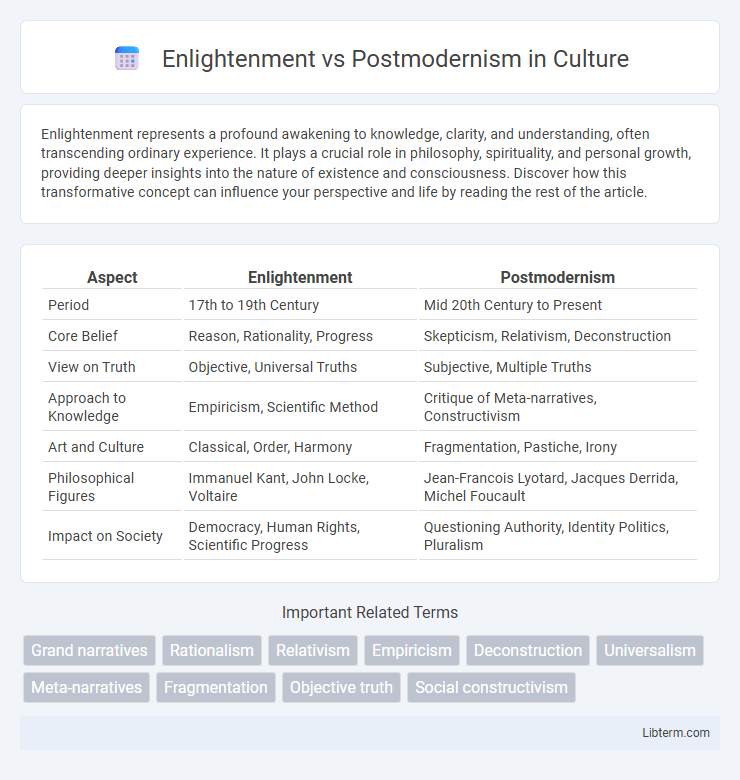Enlightenment represents a profound awakening to knowledge, clarity, and understanding, often transcending ordinary experience. It plays a crucial role in philosophy, spirituality, and personal growth, providing deeper insights into the nature of existence and consciousness. Discover how this transformative concept can influence your perspective and life by reading the rest of the article.
Table of Comparison
| Aspect | Enlightenment | Postmodernism |
|---|---|---|
| Period | 17th to 19th Century | Mid 20th Century to Present |
| Core Belief | Reason, Rationality, Progress | Skepticism, Relativism, Deconstruction |
| View on Truth | Objective, Universal Truths | Subjective, Multiple Truths |
| Approach to Knowledge | Empiricism, Scientific Method | Critique of Meta-narratives, Constructivism |
| Art and Culture | Classical, Order, Harmony | Fragmentation, Pastiche, Irony |
| Philosophical Figures | Immanuel Kant, John Locke, Voltaire | Jean-Francois Lyotard, Jacques Derrida, Michel Foucault |
| Impact on Society | Democracy, Human Rights, Scientific Progress | Questioning Authority, Identity Politics, Pluralism |
Origins and Historical Context
The Enlightenment emerged in the 17th and 18th centuries, rooted in reason, scientific inquiry, and ideals of progress inspired by figures such as Immanuel Kant and John Locke, emphasizing rationality and universal truths during the Age of Reason. Postmodernism arose in the mid-20th century as a reaction to Enlightenment principles, challenging objective knowledge and grand narratives through skepticism, relativism, and critiques from thinkers like Michel Foucault and Jean-Francois Lyotard. The historical context of Enlightenment centers on the rise of modernity and the scientific revolution, while Postmodernism reflects the fragmentation and uncertainty of the post-World War II era.
Core Philosophical Principles
Enlightenment philosophy centers on reason, universal truths, and objective knowledge as means to progress and human emancipation. Postmodernism challenges these ideals by emphasizing relativism, skepticism toward meta-narratives, and the subjective construction of reality through language and power structures. This philosophical shift critiques Enlightenment's reliance on absolute reason, advocating instead for pluralism and the deconstruction of established truths.
Key Figures and Thinkers
Immanuel Kant, often dubbed the central figure of the Enlightenment, emphasized reason, autonomy, and universal truths, shaping modern Western philosophy and ethics. Postmodernism, characterized by skepticism towards grand narratives and objective truth, finds key thinkers in Jean-Francois Lyotard, who critiqued meta-narratives, and Michel Foucault, known for his analysis of power and knowledge structures. Friedrich Nietzsche's critique of Enlightenment values bridges both movements by challenging objective morality and emphasizing perspectivism.
Reason and Rationality
Enlightenment philosophy emphasizes reason and rationality as the primary tools for achieving knowledge, progress, and universal truths, advocating for objective analysis and empirical evidence. Postmodernism challenges these principles by questioning the existence of absolute reason, highlighting the role of subjective experience and cultural context in shaping knowledge. This philosophical shift critiques Enlightenment's reliance on universal rationality, promoting pluralism and skepticism toward grand narratives.
Truth and Knowledge
Enlightenment philosophy emphasizes objective truth and reason as the foundations for knowledge, promoting universal principles and empirical evidence. Postmodernism challenges these notions by questioning the existence of absolute truth, highlighting the role of social constructs, power dynamics, and subjective interpretations in shaping knowledge. The debate centers on whether knowledge is a fixed reality or fluid and context-dependent, influencing epistemology and cultural understanding.
Individualism vs Relativism
Enlightenment philosophy emphasizes individualism, advocating for reason, autonomy, and universal truths as foundations for human rights and progress. Postmodernism challenges these notions by promoting relativism, arguing that knowledge, morality, and reality are culturally constructed and context-dependent. This shift undermines the Enlightenment's search for objective truths, prioritizing diverse perspectives and skepticism toward meta-narratives.
Science and Progress
Enlightenment champions science as a path to objective knowledge and linear progress, emphasizing rationality, empirical evidence, and universal truths. Postmodernism questions the singularity of scientific narratives, highlighting the influence of cultural, social, and linguistic contexts on knowledge production, thereby challenging the notion of absolute progress. This epistemological shift reframes science as a localized, interpretive practice rather than an infallible engine of universal advancement.
Critique of Authority and Tradition
Enlightenment thought champions reason and empirical evidence as foundations for challenging established authority and traditional beliefs, promoting individual autonomy and scientific progress. Postmodernism critiques Enlightenment's universal claims by emphasizing the relativity of truth and the power structures embedded within all knowledge systems, questioning absolute authority and grand narratives. Both movements engage deeply with authority and tradition, but while Enlightenment seeks to reform through rational critique, postmodernism deconstructs accepted norms to reveal underlying biases and social constructs.
Impact on Art and Culture
Enlightenment emphasized reason, clarity, and universal truths, leading to neoclassical art and a focus on symmetry, harmony, and idealized forms reflecting human progress. Postmodernism challenged these principles by embracing ambiguity, fragmentation, and pastiche, resulting in diverse, eclectic artworks that question established narratives and cultural hierarchies. This shift transformed art and culture by promoting pluralism, skepticism of grand theories, and the inclusion of marginalized voices and subcultures.
Contemporary Relevance and Debate
The Enlightenment's emphasis on reason, scientific progress, and universal truths continues to influence contemporary debates on democracy, human rights, and education, asserting the importance of objective knowledge and rational discourse. Postmodernism challenges these notions by critiquing grand narratives and emphasizing relativism, plurality, and the deconstruction of power structures, fueling ongoing discussions about identity, culture, and truth in a globalized world. The tension between Enlightenment ideals and postmodern skepticism shapes critical academic and social conversations, highlighting the complexities of truth, authority, and meaning in contemporary society.
Enlightenment Infographic

 libterm.com
libterm.com